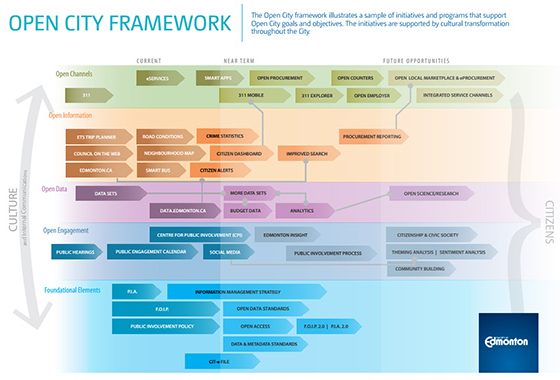OVERVIEW
Edmonton’s Open City Initiative was implemented in lieu with the city’s wish to become a city which is more transparent, open and accessible as well as connected to its public. Here, the Open City Policy acts as the umbrella for all open government work within Edmonton and provides the guidelines for implementation.
The project was launched in collaboration with various governmental committees such as the City’s Executive Committee, the Corporate Leadership Team, the City’s Smart City Governance Committee and the Open City and Innovation Branch, who acts as the continuous and official overseer of the project. The initiative has not only impacted how public policy decisions are made, it has also resulted in the creative use of data by citizens, developers and businesses. After one year of implementation, Edmonton managed to have up to 927 datasets and 53% returning users.

FEATURES

There are two main components of the Open City Initiative: Open Data and Analytics Centre for Excellence. The Open Data Portal comprises of several initiatives including the Citizen Dashboard, the Open Budget, the Open Data Catalogue and the 311 Open Data.
- The Citizen Dashboard is created with the mindset of accountability towards its citizens and showcases performance data for select services that the city provides, specifically within the category of transportation, livability, environment, urban form, economy, and finance.
- The Open Budget website provides information and transparency on how the city’s public funds are allocated and make it easily understandable by all citizens.
- Open Data Catalogue gives citizens access to city department-wide datasets on various topics
- The 311 Open Data and Edmonton 311 website allows citizens to view reports and requests generated throughout their neighborhood while increasing while also increasing accessibility o municipal services that allow for citizens to submit their complaints and suggestions.
- The Analytics Centre for Excellence focuses on the transition of data to information both for Citizens and for internal stakeholders. It also provides tools and resources to empower citizens to work with data themselves to gain their own insights into City data
KEY RESULTS
- More than 250 students from the university of Alberta and Northern Alberta Institute of Technology have participated in the open science program
- Open City Wi-Fi service has been expanded to include 83 locations, including 15 Capital Line Light Rail Transit (LRT) stations, 37 public facilities, and 17 libraries
- The Edmonton 311 mobile app has been downloaded over 23,535 times by iOS users alone and has received 28,588 reports
RELATED POSTS
| YEAR | Datasets | Returning Users | Downloads | Near-Real Time Transit Data Downloads |
|---|---|---|---|---|
| 2015 | 927 | 139,047 (53%) | 28,987 | 950,917,988 |
| 2016 | 1,241 | 150,998 (56%) | 427,785 | 7,541,568,461 |
[/asvc_table]
There are two main components of the Open City Initiative: Open Data and Analytics Centre for Excellence.
The Open Data Portal comprises of several initiatives including the Citizen Dashboard, the Open Budget, the Open Data Catalogue and the 311 Open Data
- The Citizen Dashboard is created with the mindset of accountability towards its citizens and showcases performance data for select services that the city provides, specifically within the catery of transportation, livability, environment, urban form, economy, and finance.
- The Open Budget website provides information and transparency on how the city’s public funds are allocated and makes it easily understandable by all citizens.
- Open Data Catalogue gives citizens access to city department-wide datasets on various topics
- The 311 Open Data and Edmonton 311 website allows citizens to view reports and requests generated throughout their neighborhood while increasing while also increaing accessibility o municipal services that allows for citizens to submit their complaints and suggestions.
The Analytics Centre for Excllence focuses on the transition of data to information both for Citizens and for internal stakeholders.
– It also provides tools and resources to empower citizens to work with data themselves to gain their own insights into City data

